Seventy-nine pro-Palestine protesters arrested during encampment UT-Austin
Editor's note: This story has been updated to reflect the actual arrest count as reported by the sheriff's office Tuesday. See the latest updates Tuesday as pro-Palestinian encampment and arrest details are released.
Seventy-nine pro-Palestinian protesters were arrested Monday at the University of Texas after dozens of people set up an encampment on the campus’ South Mall to call for the school to divest from Israeli weapons manufacturers as well as for a cease-fire in Gaza amid the Israel-Hamas war, which has reportedly left more than 30,000 dead.
Three Travis County officials told the American-Statesman on Monday evening that at least 100 protesters were expected to be booked in jail, according to a briefing from UT leaders. The officials said the charges could include resisting arrest and assault. On Tuesday morning, the Travis County sheriff's office reported that 79 protesters were arrested Monday.
Seventy-eight of those arrested were charged with criminal trespass, and one person received an additional charge of obstructing a highway or passageway, said Kristen Dark, sheriff's office public information officer. One person was also charged with interfering with public duties, Dark said.
With chants of "Free Palestine," protesters, many of them students, formed a surprise encampment at the University of Texas on Monday afternoon, setting up tents and tables in the campus' South Mall.
"Whose lawn? Our lawn!" some protesters chanted.
The move represented an escalation by protesters after 57 people were arrested and charged with criminal trespassing during a protest on campus on Wednesday. All those charges were dropped, however, after Travis County Attorney Delia Garza, whose office handles misdemeanor cases, said her office agreed with defense lawyers that there were "deficiencies" with the probable cause arrest affidavits, which are the documents filled out by law enforcement officers to justify an arrest.
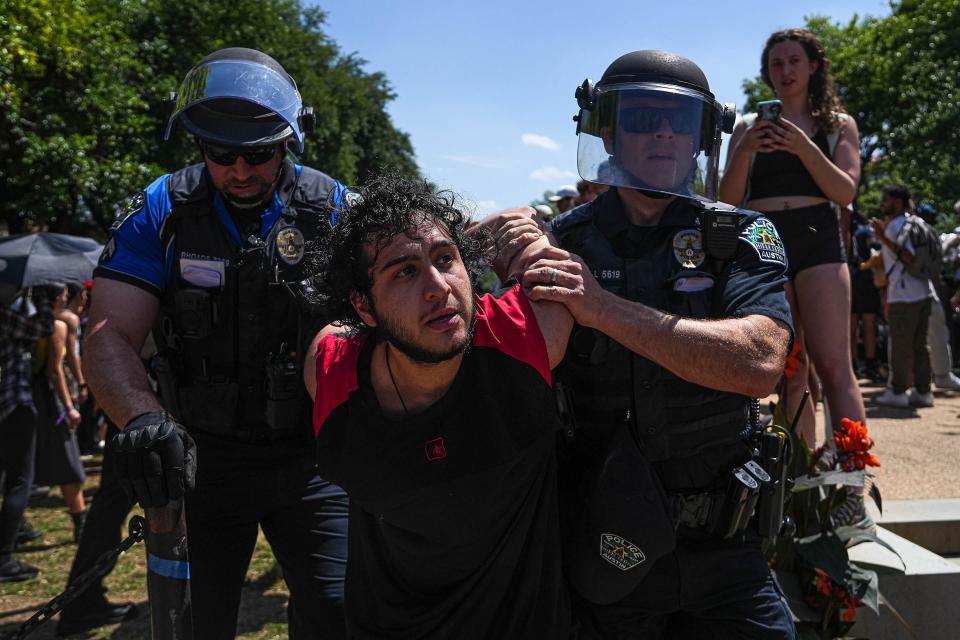
The surprise encampment came just after UT faculty at noon held a silent vigil for scholasticide, honoring the loss of education life in Gaza, and a rally for diversity, equity and inclusion on the west side of the UT Tower at 12:15 p.m.
Pro-Palestinian protesters gathered peacefully at UT for several days last week, and the encampment Monday was held in solidarity with others at several universities across the nation calling for their schools to divest from Israeli weapons manufacturers and as well as for a ceasefire in Gaza.
More than 30,000 people have reportedly died in Gaza after Israel has bombarded the region in response to a deadly Oct. 7 attack on the Jewish state by Hamas, a Palestinian militant group.
Attorneys: Probable cause affidavits for arrested UT protesters not yet available
Attorneys have not yet received probable cause affidavits for protesters arrested at UT on Monday, said Bradley Hargis, executive director of the Capital Area Private Defender Service. These affidavits reveal what probable cause officers had to arrest someone.
Hargis said he's been told officers with UT police are individually writing each of the affidavits. They have 24 hours to submit the documens.
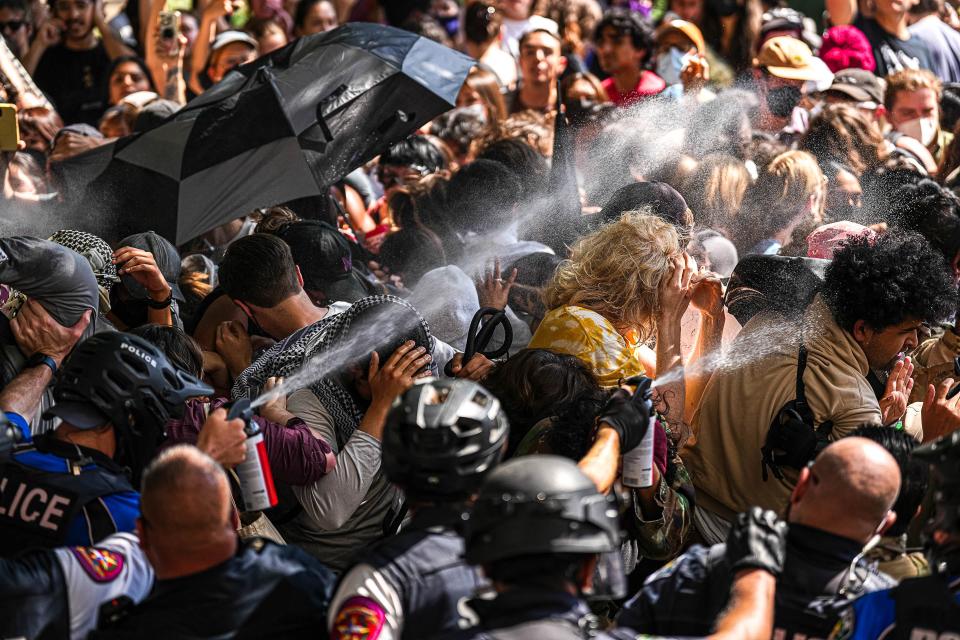
The affidavits are then reviewed by a magistrate judge who determines if an officer had probable cause to make an arrest. Without those affidavits, people cannot be released from the Travis County jail.
At last count, 25 people had been booked in jail in relation to the protest. All of them were charged with criminal trespassing, the same charge that the 57 protesters arrested Wednesday faced before they were dropped.
Travis County officials told the American-Statesman that at least 100 people were arrested Monday at UT, and some could face different charges including evading arrest and assault.
During last week's arrests, the county attorney's office declined to pursue charges because they "lacked probable cause."
Lawyers at the time said that UT police appeared to have "copied and pasted" the affidavits for the 57 protesters. The Statesman obtained 11 of those affidavits, all of which were similar, some word for word.
The UT police did not immediately return a request for comment about the process officers are taking Monday in writing the probable cause affidavits.
— Skye Seipp
Dozens gathered at Travis County jail, demanding protesters' release
Dozens of people have gathered at the Travis County jail to call for the release of everyone arrested at Monday's pro-Palestine protest at UT.
Among the supporters are also family and friends of people arrested. A table with free food and drinks has been set up, along with signs that read "divest from genocide" and "let them go."
George Lobb, an attorney with the Austin News Guild, said about 6:45 p.m. that 15 people had been booked in jail, all of whom were charged with criminal trespassing.
A member of the Palestine Solidarity Committee, who would not give his name, said the groups intends to stay at the jail until everyone is released, just as they did last week when 57 protesters were arrested at a UT protest Wednesday.
PSC did not organize Monday's protest and pop-up encampment, but members have said they will be supporting in any way, including by taking protesters food and water.
— Skye Seipp
At least 100 pro-Palestine protesters arrested at UT Monday, officials say
Travis County officials have been told that more than 100 protesters may soon be taken to jail and charged with crimes including resisting arrest and possibly assault, according to three county officials who have been informed of the situation by UT leaders.
When 57 protesters were arrested at UT on Wednesday, all were charged with criminal trespassing. The charges were thrown out after the Travis County attorney's office, in consolation with defense attorneys, found the probable cause affidavits to be deficient.
— Tony Plohetski
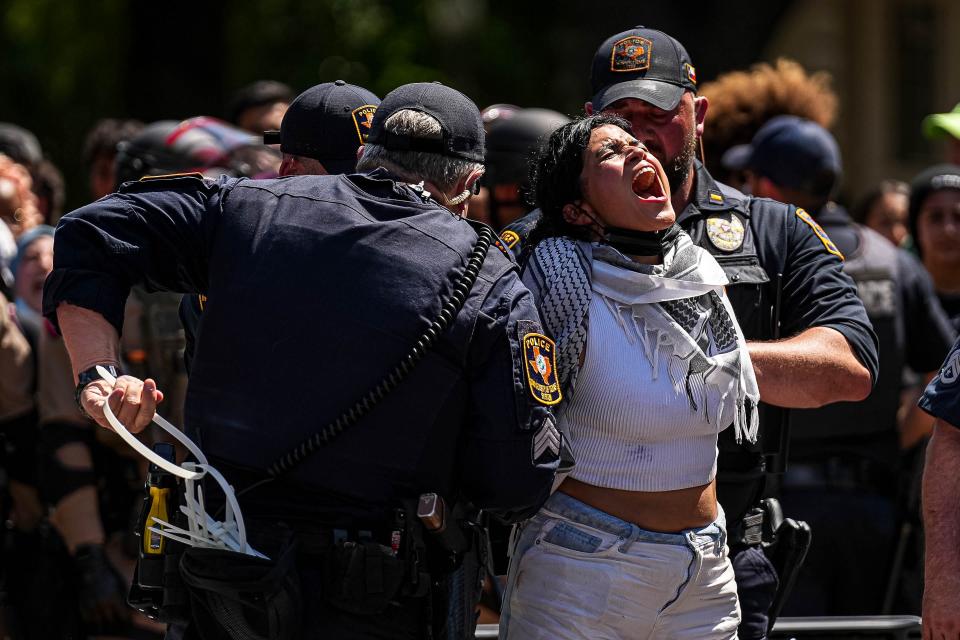
At least 43 arrested Monday, attorney says
At least 43 people had been arrested in connection with the protest by 5 p.m., said George Lobb, an attorney with the Austin Lawyers Guild, an association of activist legal workers.
Lobb said he expected the number was even higher.
— Lily Kepner
Individuals, groups not affiliated with UT among encampment organizers
Ammer Qaddumi, a UT student and member of the Palestine Solidarity Committee, said the student group did not organize Monday’s protests as it has been placed on interim suspension by the university.
While the Palestine Solidarity Committee publicly supports the efforts of protesters and is organizing to bring water and other resources to protesters, many members are staying away as they wait on the outcome of UT’s investigation into the student organization.
Qaddumi noted that the committee has organized numerous campus protests without incident and that other groups have stepped in to fill the void left by its interim suspension. He suggested they may not be able to maintain order as effectively.
“UT’s suspension of our organization will absolutely come with some limitations to what we can do on campus, but we are not the sole advocates for Palestine," Qaddumi said. "In Austin we have been fortunate to create coalitions and partnerships with other solidarity groups that will continue the struggle where we can’t. They can try to suspend PSC, but the movement will carry on through others until they adhere to our demands.”
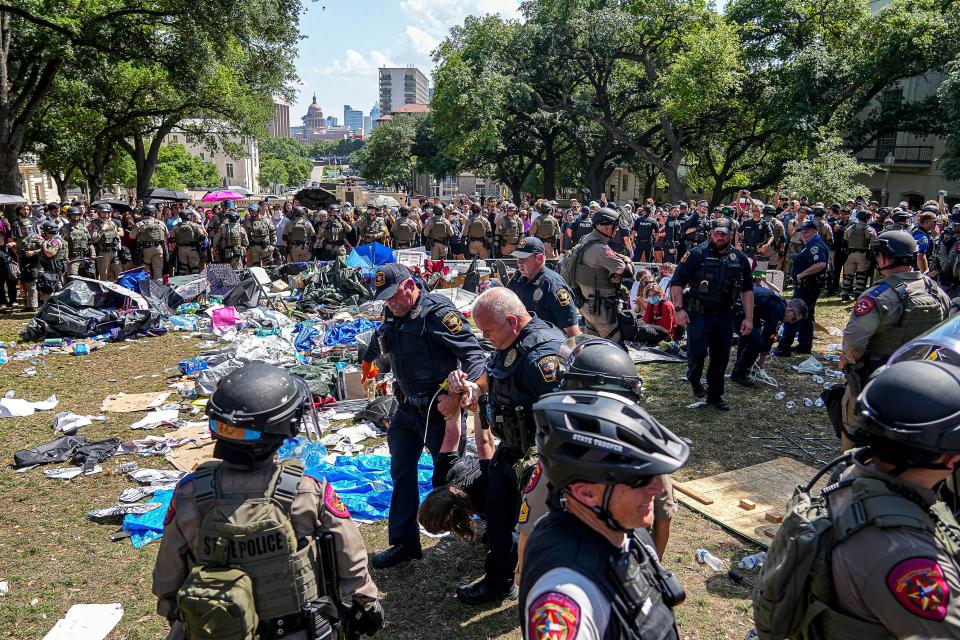
No single group has taken credit for organizing the encampment. A person occupying the encampment before police vacated the premises gave the American-Statesman a printed press release that included an email address for the “UT Liberated Zone,” which is similar to the name used for the encampment in an online Signal group called the “Longhorn Liberated Zone.”
Several community groups that are not officially affiliated with the University of Austin played a role in mobilizing participants through social media.
In an Instagram post Saturday, the Weelaunee Defense Society wrote of an imagined, future “Liberated Zone” on the UT campus, describing plans for a growing encampment and a total disruption of campus operations by community-led protests.
That same day, the group’s Instagram account also posted a link to a group chat on the encrypted messaging app Signal called “Longhorn Liberated Zone.” Anonymous administrators posted announcements and videos of the protest several times Monday.
The Weelaunee Defense Society wrote another post at around 1 p.m. Monday announcing the start of the encampment and calling for "all hands on deck" from UT students and the Austin community.
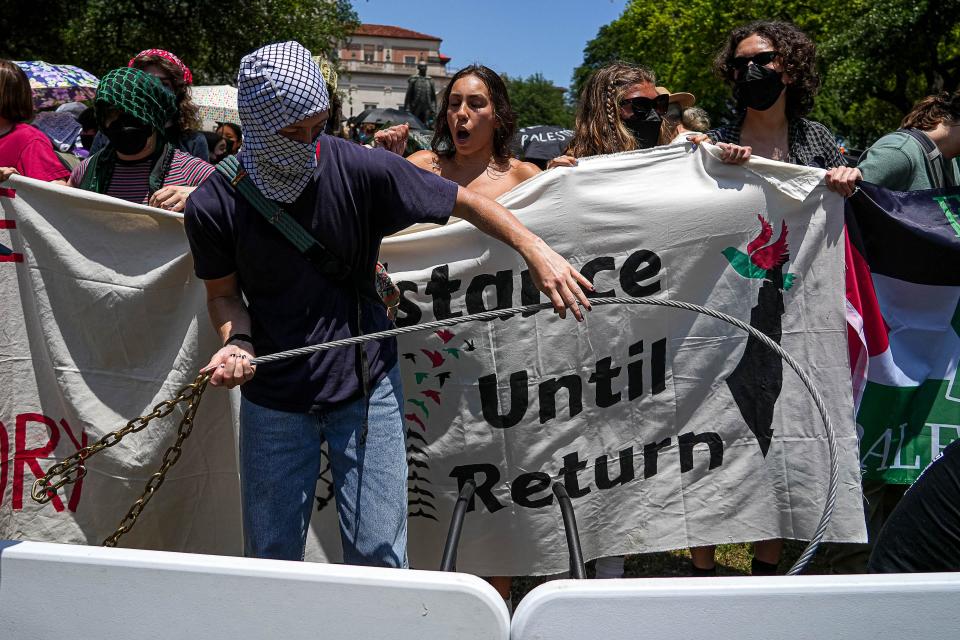
Pro-Palestinian organizations including the Palestinian Youth Movement and the Austin for Palestine Coalition also posted that they were participating in the encampment in joint Instagram posts with the Weelaunee Defense Society.
— Bayliss Wagner, Skye Seipp and Aaron Martinez
UT student says police pepper-sprayed protesters
Georgina Bermudez, a senior biochemistry student at UT, said that she was pepper-sprayed while students were trying to stop a van transporting arrestees on Inner Campus Drive. “Nobody was doing anything violent against police. We’re literally just standing there,” Bermudez said. She said that police did not give a warning before deploying the pepper spray, and students scattered.“It was chaos,” Bermudez said.Students who were pepper-sprayed gathered in Sutton Hall, where Austin-Travis County EMS paramedics arrived to treat them.
— Serena Lin
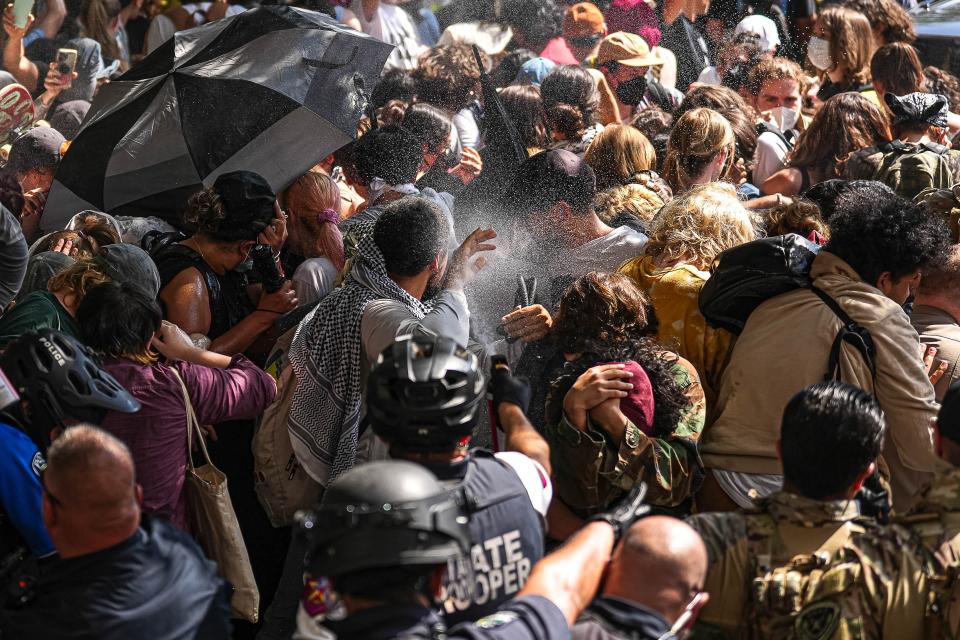
Charges faced by those arrested are unclear
Police have arrested at least 35 people who were occupying a makeshift encampment on UT’s South Lawn on Monday, but it was not immediately clear what criminal charges they are facing.
At 2:43 p.m., UT police wrote in an email dispersal notice obtained by the American-Statesman that people attending the “South Mall event” were in violation of Texas laws relating to disorderly conduct, riots, “obstructing a highway or passageway” and criminal trespass, per several sections of the Texas Penal Code.
In a statement, the university said that protesters did not "comply with Institutional Rules and remove tents assembled on the University’s South Lawn.”
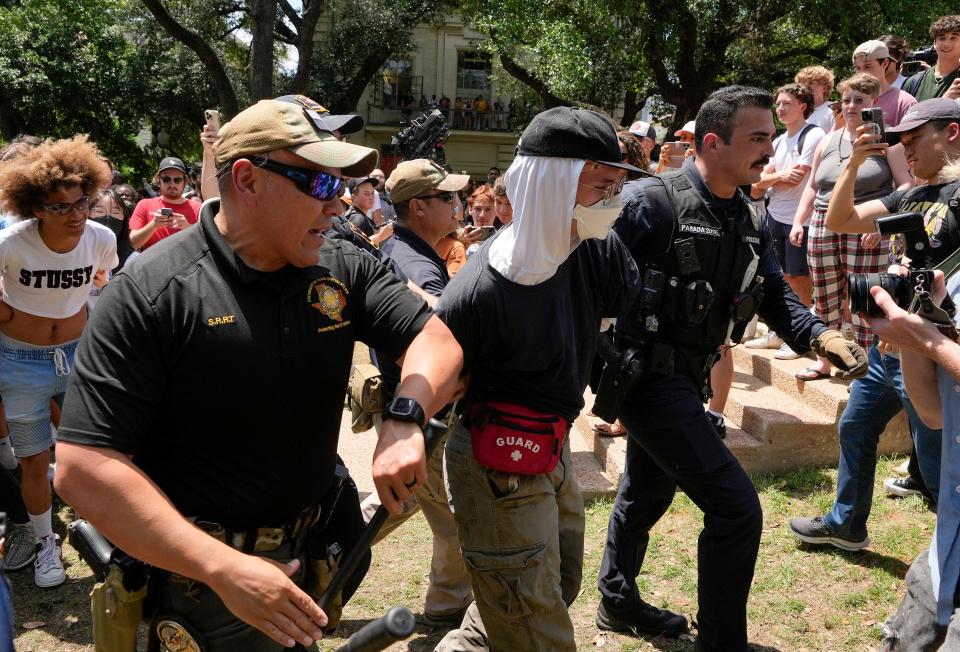
Breaking a university’s rules is not a criminal offense except in cases in which those rules overlap with criminal law.
Texas has banned residential encampments in public places that are established without a government official’s consent with House Bill 1925.
— Bayliss Wagner
Group of protesters cleared almost three hours later
By about 4 p.m., there were no more protesters on the campus's South Lawn. Members of the final group had either been arrested or left the circle voluntarily to seek medical attention.
The Statesman witnessed the arrests of at least 35 people.
— Lily Kepner
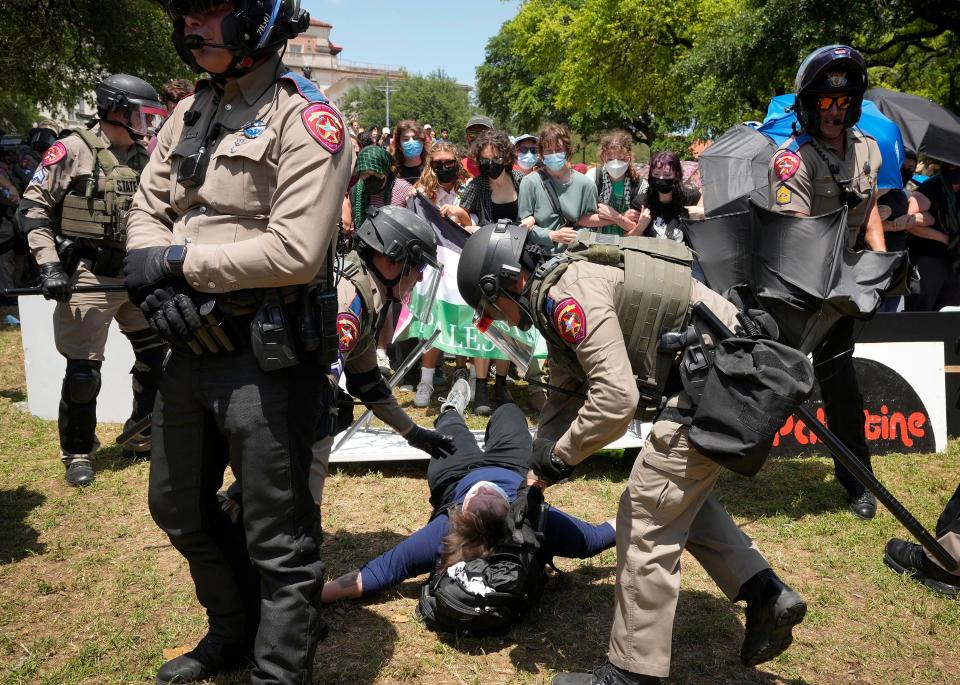
Gov. Greg Abbott doubles down on hardline response
Gov. Greg Abbott is keeping up his hardline approach to the ongoing protests at UT.
"No encampments will be allowed," Abbott said in a 3:10 p.m. reply on X to Statesman reporter Tony Plohetski's post showing law enforcement moving in to clear a would-be camp site on the university's property. "Instead, arrests are being made."
— John C. Moritz
UT issues statement, says it received online threats from group organizing protest
In a statement shared by UT spokesperson Mike Rosen at 2:30 p.m., the university said it had received "extensive online threats" on Saturday from a group organizing Monday's protest, though it did not name the group. It said the threats have been reported to local, state and federal law enforcement agencies.
The UT statement said protesters on Monday "ignored repeated directives" from university administrators and law enforcement officers to comply with university rules and remove tents on the campus's South Lawn. The university said students "physically engaged with and verbally assaulted" staff members of the Office of the Dean of Students who attempted to confiscate them.
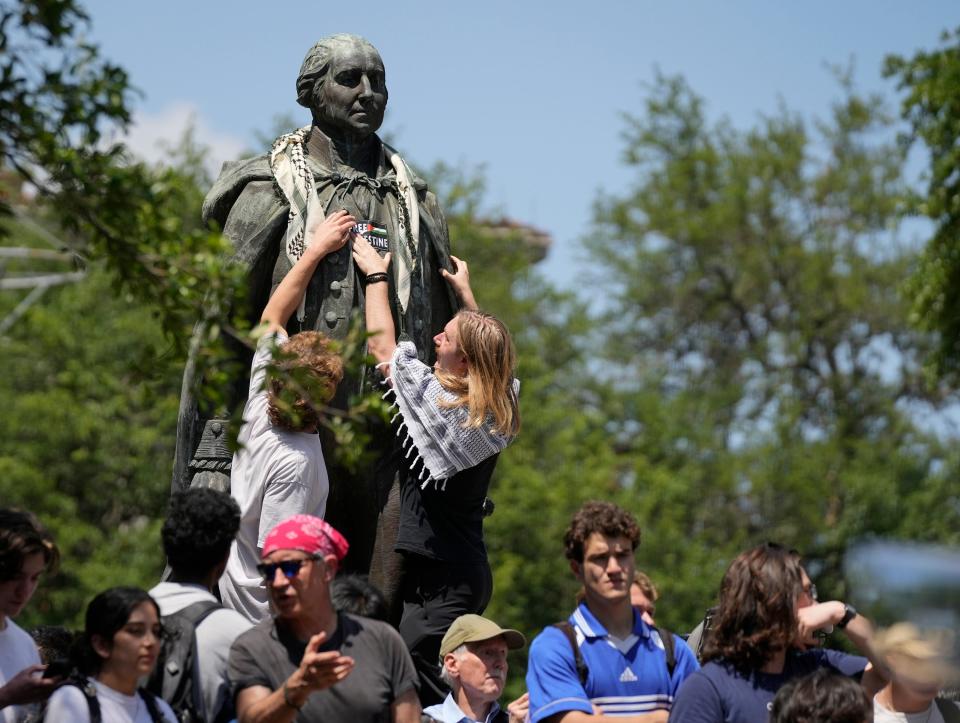
UT and law enforcement officers then dismantled the encampment and arrested "several protesters," the statement said.
"Baseball size rocks were found strategically placed within the encampment," the statement said.
The majority of the protesters are believed to be unaffiliated with the university, according to the statement.
— Tony Plohetski
Arrests made at protest; dozens of Texas Department of Public Safety troopers on campus
At least five people had been arrested by about 2 p.m., about 30 minutes after dozens of Texas Department of Public Safety troopers in riot gear arrived at the campus.
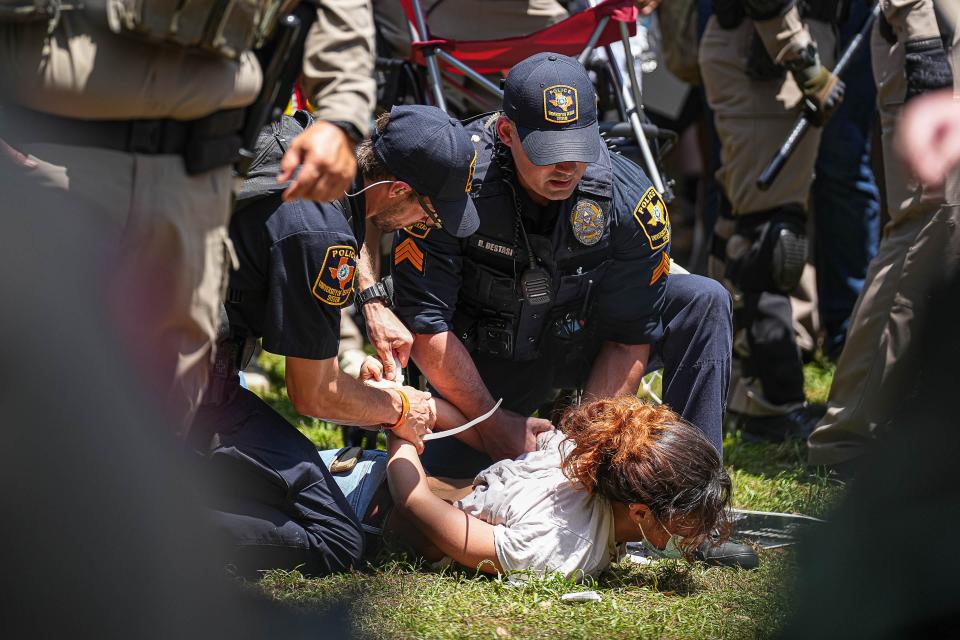
DPS troopers, UT police officers and Austin police officers could be seen forming a circle around the encampment. Protesters had created a barrier around the encampment using foldable tables, some of which appeared to be chained together. Officers could be seen using bolt cutters to cut the chains and wrestling tables from the circle.
— Lily Kepner and Chase Rogers
UT police give dispersal order at campus's South Mall
The UT Police Department announced shortly after the protest kicked off that a dispersal order had been issued. "Please leave the South Mall area immediately. Thank you for your cooperation," police said on X.
Three dispersal orders were sent to the campus community via text message at 1:12, 1:22 and 2:43 p.m., UT spokesperson Brian Davis said.
Around 1:30 p.m., police at the encampment gave a verbal dispersal order effective immediately, saying people could be arrested for rioting, disrupting a passageway or highway, or criminal trespassing.
Carl Manning-Stott, a mechanical engineering master's student at UT, said the text-messaged orders drew a far larger crowd than the protest did.
"I didn't even know there was a protest going on today, but once I got three texts from the police saying that everyone on South Lawn needs to disperse or be arrested, I felt compelled to go and offer some support," he wrote in a text to the Statesman.
"When they send messages like that, it's like the UTPD is sending up a flare signaling to 50,000 people, 'Hey, we're going to make a big scene, come check it out.'"
— Lily Kepner and Bayliss Wagner
This article originally appeared on Austin American-Statesman: UT-Austin students form Pro-Palestinian protest encampment